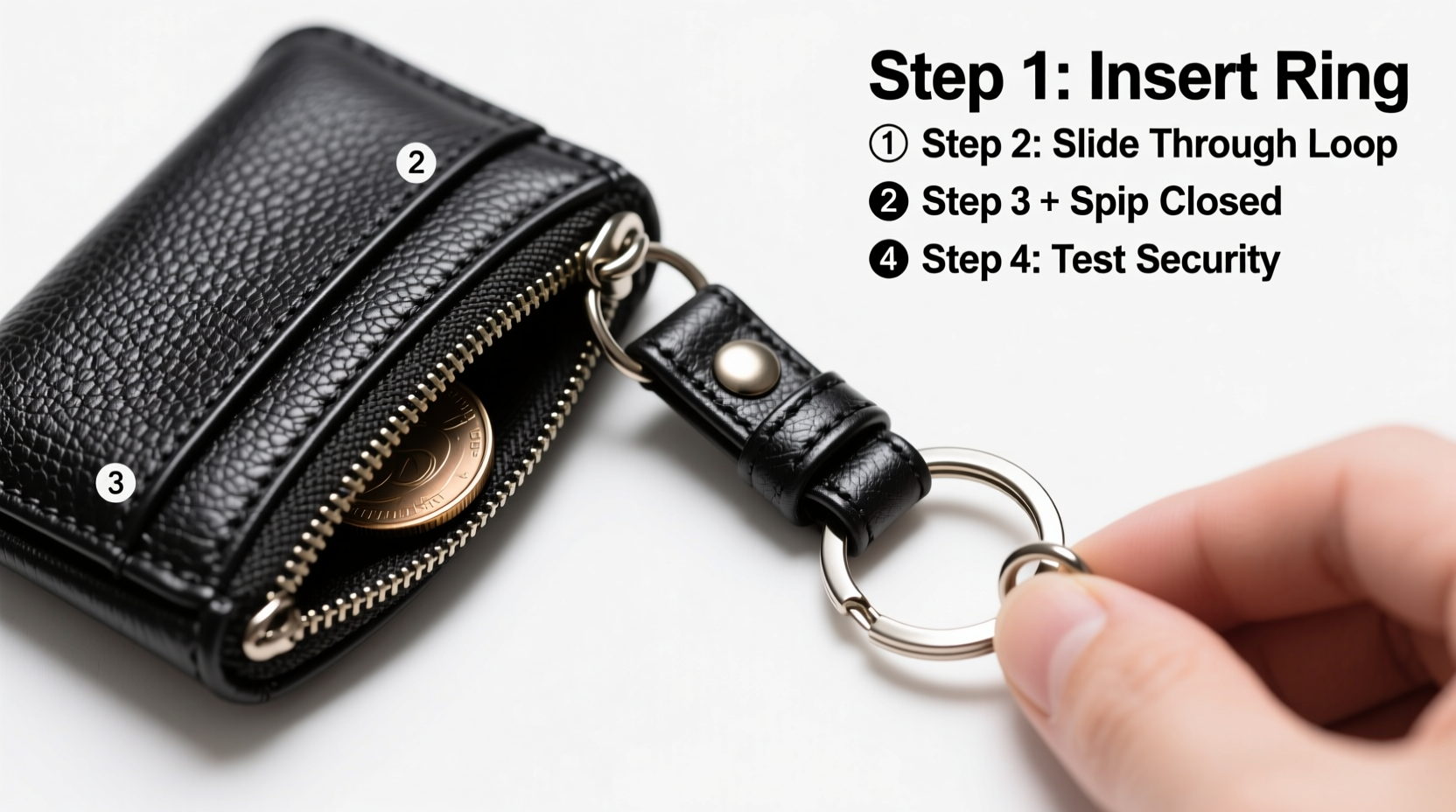In an era where every second counts and cluttered pockets slow us down, organizing everyday essentials efficiently is more important than ever. One overlooked but practical solution? Attaching a coin purse directly to your keychain. This small adjustment not only keeps loose change within reach but also reduces bulk in wallets and bags. Whether you're commuting, traveling, or just navigating a busy day, having quick access to coins can streamline vending machine purchases, parking meters, or transit fares.
This guide walks through the process of securely attaching a coin purse to your keychain using simple tools and widely available hardware. The result: a compact, personalized system that enhances convenience without sacrificing style or safety.
Why Attach a Coin Purse to Your Keychain?

The logic behind this setup goes beyond mere convenience. Many people carry keys and wallets separately, often fumbling between them when making small transactions. By integrating a coin purse into your existing keychain, you centralize essential items and reduce the risk of misplacing either.
- Efficiency: No need to open your wallet or dig through pockets for exact change.
- Security: A clipped coin purse stays with your keys—items you’re less likely to leave behind.
- Minimalism: Reduces reliance on bulky wallets, especially useful for those adopting a “slim wallet” lifestyle.
- Customization: Choose a purse that matches your aesthetic while serving a functional purpose.
“Integrating utility with habit increases the likelihood of consistent use.” — Daniel Lin, Productivity Consultant
Materials You’ll Need
Before beginning, gather the following supplies. Most can be found at hardware stores, craft shops, or online retailers like Amazon or Etsy.
| Item | Purpose | Suggested Specs |
|---|---|---|
| Coin Purse with Loop or D-Ring | Holds coins; provides attachment point | Leather or nylon with metal hardware |
| Keychain Split Ring or Carabiner | Connects purse to main keyring | 8–12mm diameter, stainless steel |
| J-Hook or Keychain Connector | Bridges purse and keys if no direct fit | Stainless or brass, 15–20mm |
| Needle-Nose Pliers | Opens and closes split rings safely | Smooth jaws to avoid scratching |
| Optional: Key Organizer or Multi-Tool Clip | Streamlines overall carry | Aluminum build with modular slots |
Step-by-Step Attachment Process
Follow these steps carefully to ensure a secure, long-lasting connection between your coin purse and keychain.
- Evaluate Your Coin Purse Design
Check whether it has a built-in loop, D-ring, or strap suitable for attachment. If not, modify it by adding a metal ring via stitching or epoxy riveting. - Select the Right Connection Method
Decide between a split ring, carabiner, or J-hook based on size, strength, and accessibility. For frequent use, a carabiner allows one-handed opening. - Prepare the Split Ring (if using)
Use needle-nose pliers to gently twist open the split ring. Do not pull it apart laterally, as this weakens the metal. - Link the Components
Slide the opened split ring through the D-ring of the coin purse first, then add your primary keyring. Ensure all elements are nested before closing. - Secure the Connection
Using pliers, carefully rotate the split ring back into its closed position. Tug lightly on both ends to test stability. - Test Functionality
Open the coin purse and simulate removing a coin while holding the entire chain. It should remain attached and balanced, without tipping or snagging.
Troubleshooting Common Issues
- Purse swings excessively: Use a shorter connector or switch to a low-profile carabiner.
- Difficulty accessing coins: Opt for a zipper-pull tab extension or reposition the purse so the opening faces outward.
- Added bulk feels cumbersome: Downsize your key bundle or adopt a minimalist key organizer.
Real-World Example: Urban Commuter Upgrade
Sophie, a graphic designer in Chicago, used to carry a full-sized wallet with her keys on a separate ring. She frequently missed trains because she couldn’t quickly retrieve her Ventra card and fare change. After reading about integrated carry systems, she purchased a slim leather coin pouch with a brass D-ring and attached it to her keychain using a titanium carabiner.
Within days, her morning routine improved. She clipped her transit card inside the purse and kept quarters for parking meters in the main compartment. Not only did she save time, but she also stopped leaving her wallet behind—because her keys and change were now inseparable.
“It’s such a small thing,” she said, “but it eliminated one of my daily stress points.”
Do’s and Don’ts of Keychain Integration
| Do’s | Don’ts |
|---|---|
| Use corrosion-resistant metal connectors | Overload the chain with unnecessary items |
| Balance weight distribution around the main ring | Attach fragile or delicate purses not designed for strain |
| Check connections monthly for wear | Use cheap, thin split rings prone to popping open |
| Choose a purse with a secure closure (zipper or snap) | Ignore sharp edges that could damage pockets or fabric |
Frequently Asked Questions
Can I attach any type of coin purse to a keychain?
Most coin purses can be adapted, but ideal candidates have built-in metal loops, D-rings, or sturdy fabric anchors. Avoid attaching purses with glued seams or plastic clips, as they may fail under regular use.
Will this make my keychain too heavy or bulky?
Not necessarily. Select a compact purse (under 2.5 inches wide) and limit stored coins to what you’ll use in a single outing. Consider removing rarely used keys to maintain balance.
How do I clean or maintain the attachment point?
Wipe down metal connectors monthly with a dry cloth. If exposed to moisture (e.g., rain or sweat), dry thoroughly and apply a drop of lubricant to split rings annually to prevent seizing.
Final Tips for Long-Term Success
Maintaining this system requires minimal effort but delivers consistent value. Reassess your setup every few months: replace worn connectors, adjust the purse position, or upgrade materials as needed. Over time, this integration becomes second nature—an invisible efficiency boost woven into your daily rhythm.
Take Action Today
Attaching a coin purse to your keychain isn't just about organization—it's about designing a personal ecosystem that supports your habits. With less friction comes greater control over your time and belongings. Gather your materials tonight, follow the steps outlined here, and experience the difference tomorrow.









 浙公网安备
33010002000092号
浙公网安备
33010002000092号 浙B2-20120091-4
浙B2-20120091-4
Comments
No comments yet. Why don't you start the discussion?